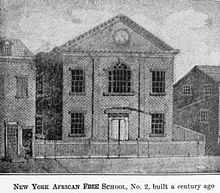Benutzer:Onkel Karlchen/James McCune Smith

James McCune Smith (*18. April 1813, New York City; † 17. November 1865, Long Island) war ein Amerikanischer Mediziner, Apotheker, Autor und ein Abolitionist. Er ist der erste Afroamerikaner in den Vereinigten Staaten, der als Mediziner arbeitete und eine Apotheke betrieb. In seinen Schriften wendete er sich vehement gegen allgemeine Auffassungen über Gesellschaft, Rassen und ihrer intellektuellen Fähigkeiten, sowie gegen Vorurteile in der Medizin. In der Afroamerikanischen Bewegung hatte er viele bekannte Freunde, Kollegen und renommierte Abolitionisten, darunter Frederick Douglass.
Biographie[Bearbeiten | Quelltext bearbeiten]
Frühe Jahre[Bearbeiten | Quelltext bearbeiten]

Smiths Mutter war eine selbstbewußte Afroamerikanerin. Sein Vater war ein weißer Kaufmann in New York.[1] Er besuchte die African Free School und wurde als "exceptionally bright student" (außergewöhnlich kluger Schüler) beschrieben.[2] Er hatte Unterricht bei Peter Williams, Jr., dem ersten afroamerikanischen Pfarrer der St. Joseph Kirche, einer Episkopalkirche in New York. Peter Williams war ebenfalls ein Absolvent der African Free School. Nach erfolgreichem Schulabschluss versuchte Smith sich auf verschiedenen Colleges einzuschreiben, wurde aber stets wegen seiner Hautfarbe zurückgewiesen.
Sein Lehrer Williams riet Smith zu einem Studium an der University of Glasgow in Schottland[3] und half ihm, die Mittel für die Reise nach Schottland und die anschließende Ausbildung zu beschaffen. Smith wurde an der Universität angenommen und schloss sein Studium als Klassenbester ab. 1835 machte er den Bachelor-Abschluss und 1836 den Master-Abschluss. 1837 schloss er sein Studium auf dem Gebiet der Medizin ab und reiste von Glasgow nach Paris um ein Praktikum zu absolvieren.[4]
Career[Bearbeiten | Quelltext bearbeiten]
Medicine[Bearbeiten | Quelltext bearbeiten]
Upon his return to New York City in 1837, Smith became the United States' first professionally trained African-American physician. His practice spanned 25 years. In 1846, he was appointed the only doctor of the Free Negro Orphan Asylum where he worked for more than twenty years.[4] He opened what has been called the first black pharmacy in the United States, which was located on West Broadway.[5]
Abolitionist Movement[Bearbeiten | Quelltext bearbeiten]
While in Scotland, Smith was a member of the Glasgow Emancipation Society.[3] When he returned to New York, he became a member of the American Anti-Slavery Society. In 1850, he was one of the key organizers of New York's resistance to the Fugitive Slave Act as a member of the Committee of Thirteen. During the mid 1850s, he helped Frederick Douglass to establish the National Council of Colored People.[2]
Essays and writings[Bearbeiten | Quelltext bearbeiten]
Smith was a prolific writer and essayist. Among other works, he wrote the introduction to Fredrick Douglass' second autobiography, My Bondage and My Freedom (1855), which constituted an important move away from seeking approval and authentication from white abolitionists in African-American accounts of slavery. In this introduction, he writes:
"...the worst of our institutions, in its worst aspect, cannot keep down energy, truthfulness, and earnest struggle for the right."[5]
Smith also wrote from the view of a trained doctor. The physician and abolitionist wrote an essay that refuted the theories of race in Thomas Jefferson's "Notes on the State of Virginia".[6] He also wrote essays that rejected phrenology and homeopathy. Yet another essay critiqued the U.S. Census of 1840 on racial and statistical grounds.
Personal life[Bearbeiten | Quelltext bearbeiten]
Smith was appointed professor of anthropology at Wilberforce College, Ohio, the oldest African-American college in the United States. but was too ill to take the position.[7] He died in Long Island, New York two years later at the age of 52, just nineteen days before the adoption of the Thirteenth Amendment to the Constitution of the United States, abolishing slavery throughout the country.[8]
Publications[Bearbeiten | Quelltext bearbeiten]
- James McCune Smith: A Lecture on the Haytien Revolutions. D. Fanshaw, New-York 1841, OCLC 16788188.
- James McCune Smith: The Destiny of the People of Color. s.n., New York 1843, OCLC 27872624.
- James McCune Smith: A Dissertation on the Influence of Climate on Longevity. Office of Merchants' Magazine, New York 1846, OCLC 34227767.
- James McCune Smith: Ira Aldridge. Arno Press; The New York Times, New York 1860, OCLC 35129946.
- James McCune Smith, Stauffer, John ed.: The Works of James McCune Smith: Black Intellectual and Abolitionist. Oxford University Press, New York 2006, ISBN 0-19-530961-8.
References[Bearbeiten | Quelltext bearbeiten]
- ↑ James McCune Smith. In: New York Divided. Abgerufen am 18. November 2008.
- ↑ a b African Free School Bios: James McCune Smith. In: NewYorkHistory.org. Abgerufen am 21. Dezember 2006.
- ↑ a b Douglas Blane: Created Equal. University of Glasgow, abgerufen am 10. Dezember 2006.
- ↑ a b James McCune Smith Biography (1813–65). 2006, archiviert vom am 30. September 2007; abgerufen am 18. November 2008.
- ↑ a b African American Medical Pioneers: James McCune Smith. In: PBS.org. Abgerufen am 10. Dezember 2006.
- ↑ T.M. Morgan: The education and medical practice of Dr. James McCune Smith. PubMed, abgerufen am 10. Dezember 2006.
- ↑ James McCune Smith. In: Biographies. Answers.com, abgerufen am 18. November 2008.
- ↑ James McCune Smith. In: American Abolitionst Biographies. Abgerufen am 10. Dezember 2006.
External links[Bearbeiten | Quelltext bearbeiten]
- African American Registry
- James M. Smith Community School.
- The African Free School Collection. at the New-York Historical Society
- Louverture Project: Toussaint Louverture and the Haitian Revolutions. - 1841 Speech by James McCune Smith
{{SORTIERUNG:Prudhomme, Louis-Marie}} [[Kategorie:Mann]] {{Personendaten |NAME=Smith, James McCune |ALTERNATIVNAMEN= |KURZBESCHREIBUNG=amerikanischer Mediziner, Autor und Politiker |GEBURTSDATUM=18. April 1813 |GEBURTSORT=[[New York City]] |STERBEDATUM=17. November 1865 |STERBEORT=[[Long Island]] }}